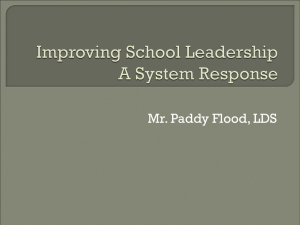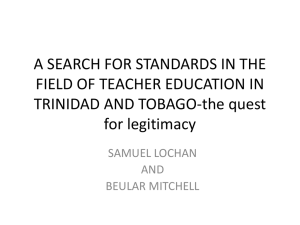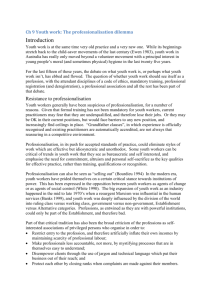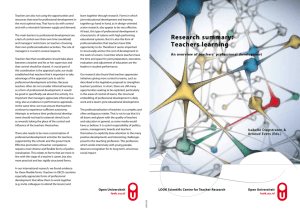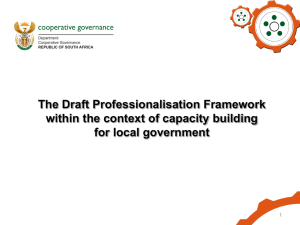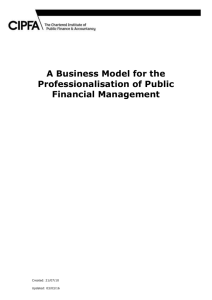Systems level governance
advertisement
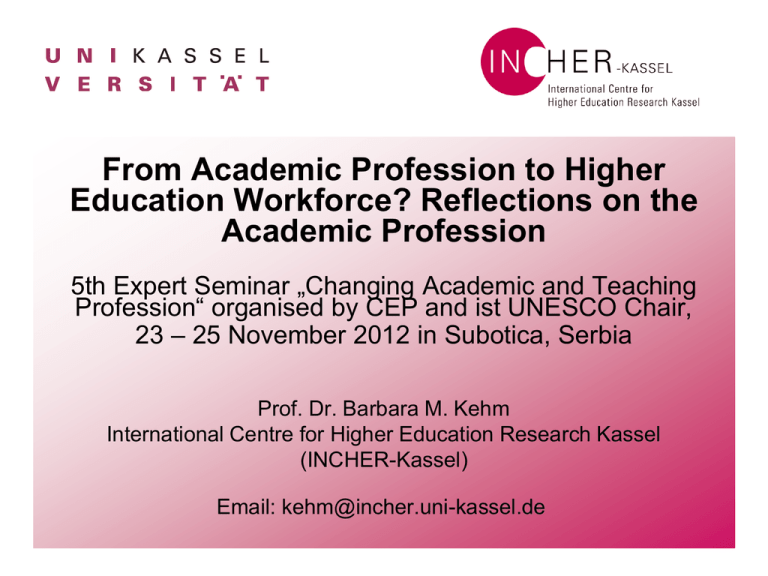
From Academic Profession to Higher Education Workforce? Reflections on the Academic Profession 5th Expert Seminar „Changing Academic and Teaching Profession“ organised by CEP and ist UNESCO Chair, 23 – 25 November 2012 in Subotica, Serbia Prof. Dr. Barbara M. Kehm International Centre for Higher Education Research Kassel (INCHER-Kassel) Email: kehm@incher.uni-kassel.de Structure 1. Introduction 2. What is Governance and does it matter? 3. The Impact of New Governance on the Academic Profession 4. The Role of the New Higher Education Professionals 5. Preliminary Conclusions 2 1. Introduction More institutional autonomy to enable HEIs to react faster and more flexibly to external challenges and demands. Acquisition of strategic decision-making capacity and professionalised management as a consequence (actorhood). Growth in number of highly qualified professionals to support these processes of change (HEPROs). 3 2. What is Governance and does it matter? Governance: intentional processes of regulation and coordination Modes: hierarchies, markets, communities, networks Higher education governance: Less State, more market, more institutional autonomy But also: more accountability, more monitoring, more competition Multi-level governance: „moving up“, „moving down“, „moving to the side“ Systems level governance How should/can universities react to changing conditions and external challenges? Weakening: state control, academic self-control Strengthening: instituional leadership, competition, role of external stakeholders But: Responsibility of the State is shifting to other arenas rather than being reduced Three new concepts of the role of the State: (a) State mediates public/social interests and makes HEIs contribute to wealth creation (b) Strong role of markets but the State protects against market failure (c) State coordinates multiple actors and stakeholders (network governance) In reality: mixture of all three approaches with an often diffuse distribution of power. The Institutional Level Reforms of internal strucutures and processes Strenghtened and professionalised management Inclusion of external stakeholders (Boards) in strategic decision-making processes Creation of a more integrated institution (becoming an organisation) to enable actorhood However, it remains unclear whether the logic of the new strcutures and processes produces the expected results Essential NPM instruments: - Lump sum budgets - Introduction of Boards - Professionalisation of top management/ deans - weakening of collegial decision-making - performance oriented salary components and budget allocation - goal agreements - evaluation and accreditation - qualitymanagement - establishment of institutional profiles and branding higher education pacts new higher education professionals increased competition and rankings 3. The Impact of New Governance on the Academic Profession Most visible: weakening of collegial decisionmaking power (abolishment of senates) Monitoring and controlling the work of the academic profession in terms of quality and output Providing incentives and/or performance related salary components Examples: Bologna reforms, doctoral training, contracts with institution as employer To summarize: New forms of professionalisation Work and performance is monitored Quality notion is externalised But: so far no restriction of academic freedom. 4. The Role of New Higher Education Professionals (HEPROs) Whitchurch (2008): „third space professionals“ Macfarlane (2011): „para-academics“ Rhoades (1998, 2001): „managerial professionals“ Deem (1998): „manager academics“ Rich body of literature in the last 20 years, dominantly from Australia, Great Britain, Norway, and the USA. 12 Central theme: „overcoming the simple dichotomy of administrative versus academic staff“ (Rhoades 1998:116). Four basic tasks and functions (Teichler 2005): Preparation and support of management decisions Professionalised services Working in a hybrid sphere (between management and services = „third space“) Differentiation of teaching and research functions. 13 First Empirical Findings INCHER currently involved in two large projects (3 years, 4 young researchers): (a) Influence of HEPROs on Teaching and Learning (funded by Federal Ministry of Education and Research) (b) EUROAC (The Changing Academic Profession in Europe) funded by the German Research Association and supported by the European Science Foundation 14 Who are they? The majority of HEPROs (60%) in Germany is female. 79 percent have a Master‘s degree, one quarter a PhD. Many with experiences in academic teaching and research. More than half have permanent positions. More than two thirds reported that they were employed in a newly created position. Ca. one quarter carry out advisory, supervisory, support, and information tasks. 19 percent see themselves in leadership functions. 17 percent have a coordinating, organising and/or managerial function. 15 What is their self-understanding? Self-understanding as professionals still weak. Professional identities vary. They see themsleves as mediators between hierarchical levels or as providers of services and support for particular groups of (internal) clients. Mostly they don‘t „control“. Mainly coordination with a high proportion of advice. Service providers or line managers. Generalists and experts rather than specialists and academics. 16 What are they doing? Broad variety of activities (18 areas identified) Highest proportion of responses (27%) stated a mixture of job tasks with no clear demarcations („unbounded“/“third space“) Working at interfaces. Shaping new fields of professional activity (e.g. Bologna reform implementation, alumni work, fundraising, graduate surveys). 17 What kind of conflicts arise and with whom? Generally positive acceptance and recognition of their work. More appreciation from institutional management than from professors. Conflicts and tensions arise from professors who are adverse to change. Complaints: high burden of work, lack of time for further qualification, fixed-term contracts, often high staff fluctuation. 18 Some European generalisations The more managerial the institutional governance, the higher the number of HEPROs. Facilitative function is appreciated, creating additional layers of bureaucracy is not. HEPROs supporting institutional management are not perceived by academics at all or their work is regarded as intransparent. HEPRO work creates new configurations of power within institutions. 19 5. Preliminary Conclusions Multitude of HEPROs sharing a few commonalities (e.g. academic background). Heterogeneous job tasks but similar contract conditions. Required competences: capability for independent work, communication skills, ability to cooperate with various status groups. Process of professionalisation ongoing but not in the traditional sociological sense. Basically: formalisation of qualification requirements, upgrading of status, emergence of a cognitive basis, and formation of networks and a common identity. 20 Academic values more important than bureaucratic values. Relationships between HEPROs and academic staff still an open question. Necessary: research on identity and its links to the changing functions and roles of academic staff and HEPROs. Indications of a shift from pure to hybrid forms of professionalisation. Middlehurst (2010): The „universal higher education professional“? Implications for changes in the ways in which professionalization is happening in HEIs. 21 Do we see a shift from the academic profession to an academic workforce? Yes: If we look at the contractual situation and the forms of monitoring and control of work and performace (most progressed in the UK). No: In most European countries not suffciently clear (yet). I prefer to speak of a differentiation of academic work and new forms of professionalisation. Research: academic identities, job satisfaction, changed forms of professionalisation. Thank you for your attention ! 23
